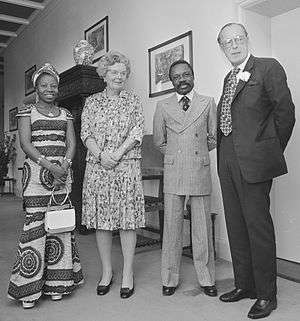Den Uyl cabinet
| Den Uyl cabinet | |
|---|---|
|
55th cabinet of the Netherlands | |
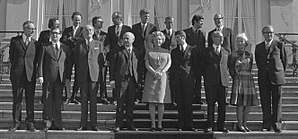 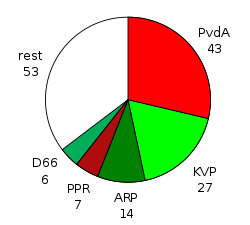 The installation of the Den Uyl cabinet on 11 May 1973 | |
| Date formed | 11 May 1973 |
| Date dissolved |
19 December 1977 (Demissionary from 22 March 1977) |
| People and organisations | |
| Head of state | Queen Juliana |
| Head of government | Joop den Uyl |
| Deputy head of government |
Dries van Agt (1973–1977) Gaius de Gaay Fortman (1977) |
| No. of ministers | 16 |
| Ministers removed (Death/resignation/dismissal) | 3 |
| Total no. of ministers | 18 |
| Member party |
Labour Party (PvdA) Catholic People's Party (KVP) Anti-Revolutionary Party (ARP) Political Party of Radicals (PPR) Democrats 66 (D'66) |
| Status in legislature | Left-wing Majority government |
| Opposition party |
People's Party for Freedom and Democracy |
| Opposition leader | Hans Wiegel |
| History | |
| Election(s) | 1972 election |
| Outgoing election | 1977 election |
| Legislature term(s) | 1972–1977 |
| Incoming formation | 1972–1973 formation |
| Outgoing formation | 1977 formation |
| Predecessor | Second Biesheuvel cabinet |
| Successor | First Van Agt cabinet |
![Azure, billetty Or a lion with a coronet Or armed and langued Gules holding in his dexter paw a sword Argent hilted Or and in the sinister paw seven arrows Argent pointed and bound together Or. [The seven arrows stand for the seven provinces of the Union of Utrecht.] The shield is crowned with the (Dutch) royal crown and supported by two lions Or armed and langued gules. They stand on a scroll Azure with the text (Or) "Je Maintiendrai" (French for "I will maintain".)](../I/m/State_coat_of_arms_of_the_Netherlands.svg.png) |
|---|
| This article is part of a series on the politics and government of the Netherlands |
|
Local government |
|
The Den Uyl cabinet was the cabinet of the Netherlands from 11 May 1973 until 19 December 1977. The cabinet was formed by the political parties Labour Party (PvdA), Catholic People's Party (KVP), Anti-Revolutionary Party (ARP), Political Party of Radicals (PPR) and the Democrats 66 (D'66) after the election of 1972. The left-wing cabinet was a majority government in the House of Representatives. Joop den Uyl, the Leader of the Labour Party was Prime Minister, with Dries van Agt of the Catholic People's Party and Gaius de Gaay Fortman of the Anti-Revolutionary Party serving as Deputy Prime Ministers.[1]
Formation
After the 1972 election the Labour Party (PvdA) of Joop den Uyl was the winner of the election which won four new seats and had now a total of 43 seats. Prior to the election the Labour Party had formed a Political alliance with the progressive Christian Political Party of Radicals and the social-liberal Democrats 66 but failed to achieve a majority in the House of Representatives. After lengthy negotiations the Christian-democratic Catholic People's Party and Anti-Revolutionary Party agreed to start talks about joining the coalition. During the formation negotiations between the parties were difficult because of disputes between uncompromising left-wing radicals and the moderate factions of the left-wing parties and the left-wing Christians. In the end both the Catholic People's Party and Anti-Revolutionary Party joined the cabinet.
Term
The cabinet Den Uyl was confronted with many problems. An early problem was the 1973 oil boycott following the Dutch support of Israel in the Yom Kippur War. Prime Minister Joop den Uyl said in a speech on national television that "things would never return to the way they were" and implemented fuel rationing and a ban on Sunday driving.
Domestically the cabinet had several major conflicts. The terrorist attacks by Moluccans seeking independence from Indonesia where a major source of problems. The Lockheed affair (bribes accepted by the queen's husband) and the closing of the abortion clinic Bloemenhove. Many plans could not be implemented because of these problems.
The cabinet fell because of a disagreement over land development plans. A deeper cause was the left-wing distrust of the Christian ministers, especially in the case of war criminal Menten, where Deputy Prime Minister and Minister of Justice Dries van Agt was ridiculed (so believed Van Agt) by some party members of Prime Minister Joop den Uyl.[2]
Changes
On 1 November 1973 Minister of Agriculture and Fisheries Tiemen Brouwer (KVP) resigned because of health reasons shortly after he took office he was struck with a brain haemorrhage. That same day State Secretary for Finance Fons van der Stee (KVP) was installed as Minister of Agriculture and Fisheries. On 21 December 1973 Martin van Rooijen (KVP), who until then had been working as the head of the fiscal tax department for Royal Dutch Shell was appointed as State Secretary for Finance.
On 1 March 1974 State Secretary for Defence Joep Mommersteeg (KVP) resigned because of health problems. On 11 March 1974 brigadier general Cees van Lent (KVP), who until then has been working as Chief of the Personnel Department of the Royal Netherlands Army was installed as his successor.
On 27 May 1975 State Secretary for Justice Jan Glastra van Loon (D'66) resigned due to a conflict with top officials at the Ministry of Defence after criticizing the department's leadership in an interview. On 6 June 1975 former Utrecht Alderman Henk Zeevalking (D'66) was appointed his successor.
On 1 September 1975 State Secretary for Education and Sciences Antoon Veerman (ARP) resigned because of health reasons.That same day Klaas de Jong (ARP), who until then has been working as rector of the Christian school in Amersfoort was installed as his successor.
On 1 January 1977 Minister of Defence Henk Vredeling (PvdA) resigned after he was appointed as European Commissioner for Employment and Social Affairs. That same day State Secretary for Defence Bram Stemerdink (PvdA) was appointed as his successor.
On 1 May 1977 State Secretary for the Interior Wim Polak (PvdA) resigned after he was appointed as Mayor of Amsterdam and because the cabinet was already demissionary he was not replaced.
On 8 September 1977 Deputy Prime Minister and Minister of Justice Dries van Agt (KVP) resigned because of the dualism of the constitutional convention in the States General of the Netherlands after he was elected as a Member of the House of Representatives. Minister of the Interior Gaius de Gaay Fortman (ARP) took over both positions until the new cabinet was installed on 19 December 1977.
For the same reason, on 8 September 1977 State Secretary for Foreign Affairs Laurens Jan Brinkhorst (D'66), State Secretary for Justice Henk Zeevalking (D'66), State Secretary for Economic Affairs Ted Hazekamp (KVP), State Secretary for Education and Sciences Ger Klein (PvdA), State Secretaries for Housing and Spatial Planning Jan Schaefer (PvdA) and Marcel van Dam (PvdA) and State Secretary for Culture, Recreation and Social Work Wim Meijer (PvdA) also resigned.
.jpg)
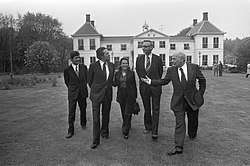
_beg%2C_Bestanddeelnr_927-6730.jpg)
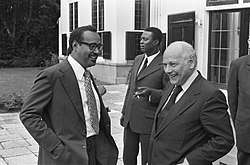
.jpg)
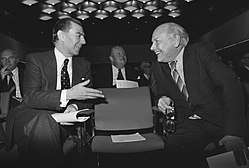
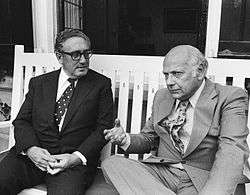

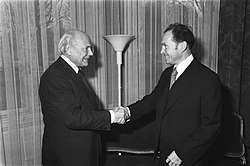
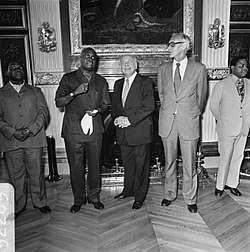
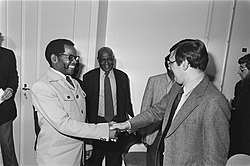
Composition
| Ministers | Title/Ministry | Term of office | Party | |||
|---|---|---|---|---|---|---|
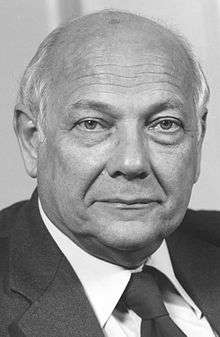 |
Joop den Uyl (1919–1987) |
Prime Minister | General Affairs | 11 May 1973 – 19 December 1977 |
Labour Party | |
.jpg) |
Dries van Agt (born 1931) |
Deputy Prime Minister / Minister |
Justice | 6 July 1971 – 8 September 1977 [Retained] [Res] |
Catholic People's Party | |
.jpg) |
Dr. Gaius de Gaay Fortman (1911–1997) |
8 September 1977 – 19 December 1977 |
Anti-Revolutionary Party | |||
| Minister | Interior | 11 May 1973 – 19 December 1977 | ||||
.jpg) |
Max van der Stoel (1924–2011) |
Minister | Foreign Affairs | 11 May 1973 – 19 December 1977 |
Labour Party | |
.jpg) |
Dr. Wim Duisenberg (1935–2005) |
Minister | Finance | 11 May 1973 – 19 December 1977 |
Labour Party | |
.jpg) |
Ruud Lubbers (1939–2018) |
Minister | Economic Affairs | 11 May 1973 – 19 December 1977 |
Catholic People's Party | |
.jpg) |
Henk Vredeling (1924–2007) |
Minister | Defence | 11 May 1973 – 1 January 1977 [Appt] |
Labour Party | |
.jpg) |
Bram Stemerdink (born 1936) |
1 January 1977 – 19 December 1977 |
Labour Party | |||
 |
Irene Vorrink (1918–1996) |
Minister | Health and Environment |
11 May 1973 – 19 December 1977 |
Labour Party | |
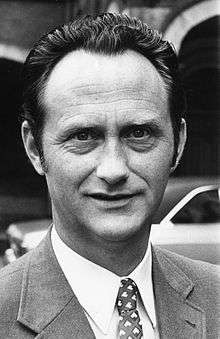 |
Jaap Boersma (1929–2012) |
Minister | Social Affairs | 6 July 1971 – 19 December 1977 [Retained] |
Anti-Revolutionary Party | |
.jpg) |
Dr. Jos van Kemenade (born 1937) |
Minister | Education and Sciences |
11 May 1973 – 19 December 1977 |
Labour Party | |
.jpg) |
Tjerk Westerterp (born 1930) |
Minister | Transport and Water Management |
11 May 1973 – 19 December 1977 |
Catholic People's Party | |
.jpg) |
Tiemen Brouwer (1916–1977) |
Minister | Agriculture and Fisheries |
11 May 1973 – 1 November 1973 [Res] |
Catholic People's Party | |
.jpg) |
Fons van der Stee (1928–1999) |
1 November 1973 – 5 March 1980 |
Catholic People's Party | |||
.jpg) |
Hans Gruijters (1931–2005) |
Minister | Housing and Spatial Planning |
11 May 1973 – 19 December 1977 |
Democrats 66 | |
.jpg) |
Harry van Doorn (1915–1992) |
Minister | Culture, Recreation and Social Work |
11 May 1973 – 19 December 1977 |
Political Party of Radicals | |
| Ministers without portfolio | Title/Portfolio/Ministry | Term of office | Party | |||
.jpg) |
Jan Pronk (born 1940) |
Minister | Development Cooperation (within Foreign Affairs) |
11 May 1973 – 19 December 1977 |
Labour Party | |
.jpg) |
Boy Trip (1921–1990) |
Minister | Science Policy (within Education and Sciences) |
11 May 1973 – 19 December 1977 |
Political Party of Radicals | |
.jpg) |
Dr. Gaius de Gaay Fortman (1911–1997) |
Minister | Suriname and Netherlands Antilles Affairs (within Interior) |
11 May 1973 – 25 November 1975 |
Anti-Revolutionary Party | |
| Netherlands Antilles Affairs (within Interior) |
25 November 1975 – 19 December 1977 | |||||
| State Secretaries | Title/Portfolio/Ministry | Term of office | Party | |||
 |
Wim Polak (1924–1999) |
State Secretary | • Central Government Affairs • Local Government Affairs • Government Real Estate (within Interior) |
11 May 1973 – 1 May 1977 [Appt] |
Labour Party | |
.jpg) |
Laurens Jan Brinkhorst (born 1937) |
State Secretary | • European Affairs • NATO Affairs • Benelux Affairs • International Aviation Policy (within Foreign Affairs) |
11 May 1973 – 8 September 1977 [Res] |
Democrats 66 | |
.jpg) |
Dr. Pieter Kooijmans (1933–2013) |
• United Nations Affairs • International Cooperation (within Foreign Affairs) |
11 May 1973 – 19 December 1977 |
Anti-Revolutionary Party | ||
.jpg) |
Fons van der Stee (1928–1999) |
State Secretary | • Fiscal Affairs • Tax and Customs Administration • National Mint (within Finance) |
11 May 1973 – 1 November 1973 [Appt] |
Catholic People's Party | |
.jpg) |
Martin van Rooijen (born 1942) |
21 December 1973 – 14 October 1977 [Res] |
Catholic People's Party | |||
.jpg) |
Aar de Goede (1928–2016) |
• Local Government Finances • Gambling Policy • State Lottery (within Finance) |
11 May 1973 – 19 December 1977 |
Democrats 66 | ||
.jpg) |
Dr. Jan Glastra van Loon (1920–2001) |
State Secretary | • Integration • Immigration • Asylum Affairs • Privacy Policy • Administrative Law • Family Law • Youth Justice (within Justice) |
13 June 1973 – 27 May 1975 [Res] |
Democrats 66 | |
 |
Henk Zeevalking (1922–2005) |
6 June 1975 – 8 September 1977 [Res] |
Democrats 66 | |||
.jpg) |
Ted Hazekamp (1926–1987) |
State Secretary | • Small Business Policy • Retail Policy • Competition Policy • Regional Development • Consumer Protection • Tourism Affairs (within Economic Affairs) |
11 May 1973 – 11 September 1981 |
Catholic People's Party | |
.jpg) |
Joep Mommersteeg (1917–1991) |
State Secretary | • Personnel Affairs (within Defence) |
11 May 1973 – 1 March 1974 [Res] |
Catholic People's Party | |
.jpg) |
Brigadier general Cees van Lent (1922–2000) |
11 March 1974 – 11 September 1981 |
Catholic People's Party | |||
.jpg) |
Bram Stemerdink (born 1936) |
• Equipment Policy • Military Justice (within Defence) |
11 May 1973 – 1 January 1977 [Appt] |
Labour Party | ||
.jpg) |
Jo Hendriks (1923–2001) |
State Secretary | • Elderly Policy • Disability Affairs • Veteran Affairs • Environmental Policy (within Health and Environment) |
11 May 1973 – 19 December 1977 |
Catholic People's Party | |
 |
Jan Mertens (1916–2000) |
State Secretary | • Social Security • Occupational Safety (within Social Affairs) |
11 May 1973 – 19 December 1977 |
Catholic People's Party | |
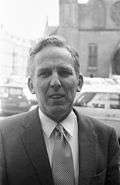 |
Dr. Ger Klein (1925–1998) |
State Secretary | • Higher Education • Adult Education • Teacher Policy (within Education and Sciences) |
11 May 1973 – 8 September 1977 [Res] |
Labour Party | |
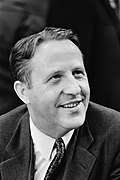 |
Dr. Antoon Veerman (1916–1993) |
• Secondary Education • Special Education (within Education and Sciences) |
11 May 1973 – 1 September 1975 [Res] |
Anti-Revolutionary Party | ||
.jpg) |
Klaas de Jong (1926–2011) |
1 September 1975 – 11 September 1981 |
Anti-Revolutionary Party | |||
%2C_Bestanddeelnr_926-0050.jpg) |
Dr. Michel van Hulten (born 1930) |
State Secretary | • Transport Infrastructure • Water Infrastructure • Public Transport • Postal Service • Weather Forecasting Service (within Transport and Water Management) |
11 May 1973 – 19 December 1977 |
Political Party of Radicals | |
.jpg) |
Jan Schaefer (1940–1994) |
State Secretary | • Urban Planning • Spatial Planning (within Housing and Spatial Planning) |
11 May 1973 – 8 September 1977 [Res] |
Labour Party | |
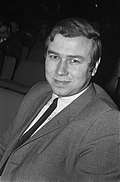 |
Marcel van Dam (born 1938) |
• Public Housing (within Housing and Spatial Planning) |
11 May 1973 – 8 September 1977 [Res] |
Labour Party | ||
.jpg) |
Wim Meijer (born 1939) |
State Secretary | • Unemployment Affairs • Social Services • Youth Policy • Poverty Policy • Nature Policy • Recreation Affairs • Sport (within Culture, Recreation and Social Work) |
11 May 1973 – 8 September 1977 [Res] |
Labour Party | |
| Source: (in Dutch) Rijksoverheid | ||||||
- Retained Retained this position from the previous cabinet.
- Appt Appointment: Henk Vredeling appointed European Commissioner; Wim Polak appointed Mayor of Amsterdam; Fons van der Stee appointed Minister of Agriculture and Fisheries; Bram Stemerdink appointed Minister of Defence.
- Res Resigned.
Living cabinet members
- As of 2018, the following cabinet members are still alive:
- Ministers
- Dries van Agt – 2 February 1931
- Bram Stemerdink – 6 March 1936
- Jos van Kemenade – 6 March 1937
- Tjerk Westerterp – 2 December 1930
- Jan Pronk – 16 March 1940
- State Secretaries
- Laurens Jan Brinkhorst – 18 March 1937
- Martin van Rooijen – 31 July 1942
- Michel van Hulten – 9 March 1930
- Marcel van Dam – 30 January 1938
- Wim Meijer – 16 August 1939
- Ministers
References
- ↑ (in Dutch) "De hobbelstrategie". De Groene Amsterdammer. 25 October 1995. Retrieved 15 August 2017.
- ↑ (in Dutch) "Waarom het kabinet-Den Uyl moest vallen; Bonje om de premier-bonus". NRC Handelsblad. 22 March 1997. Retrieved 31 July 2018.
External links
- Official
- (in Dutch) Kabinet-Den Uyl Parlement & Politiek
- (in Dutch) Kabinet-Den Uyl Rijksoverheid
| Wikimedia Commons has media related to Cabinet Den Uyl. |
